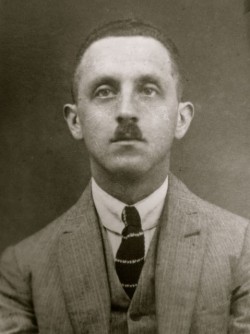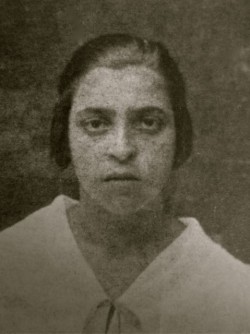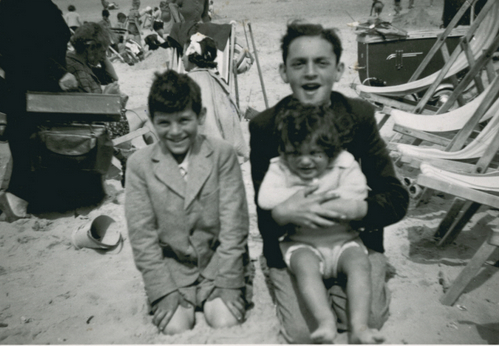Gross
Visa Recipients
- GROSS, Fred/Fredy P T
Age 3 - GROSS, Leo/Leon P
Age 12 - GROSS, Max/Marcus P
Age 43 - GROSS, Nacha née RAJCHERT P
Age 37 - GROSS, Sam P
Age 16
About the Family
The GROSS family received visas issued by Aristides de Sousa Mendes in Bordeaux in June 1940.
In June 1940 the family was sent to an internment camp near the southern French village of Gurs. They soon escaped and made their way to Nice. In 1942 Sam GROSS went to Portugal and the rest of the family went to Switzerland. After the war they returned to Belgium, and in March 1946 they sailed on the Liberty ship James W. Johnson from Antwerp to Norfolk, Virginia.
- Photos
- Testimonial
Testimonial of Fred Gross
from his memoir, One Step Ahead of Hitler: A Jewish Child's Journey Though France, 2009
Bordeaux, a prominent port city on the Atlantic coast in southwestern France, was already swarming with thousands of displaced people. We craved some peace after dodging the German warplanes and watching the sky turn dark from the ashes of burning villages... We were lucky to find a room. Many others slept in cars and trucks, on park benches and sidewalks, in public gardens and inside the train station. I longed for my train set to keep me amused, or for Mama to at least read a book to me or play a game...
The only excitement during the first few days in Bordeaux was the news from the radio. What blared out didn't make any sense to me. I heard words like Dunkirk, Hitler, Churchill, Paris, but I wasn't able to piece them together to understand what was happening...
The only safe path out of the Nazi stranglehold was southern France. Refugees continued to stream into Bordeaux by the tens of thousands from all over Europe, mostly from Holland, Belgium, and northern France...
Other families began to think about escaping through neutral Spain and Portugal. We were a little more than 100 miles from Spain's northernmost border. Portugal was safely lodged on the edge of the Atlantic Ocean in the Iberian Peninsula and separated from an embattled France by the bast barren land of Spain. However, without a Portuguese entry visa the Spanish government wouldn't allow Jews to pass through...
We stayed outside the hotel, which was in the center of town near the railroad station and a short distance from the Portuguese consulate. Many refugees wandered there, hinging their hopes for freedom on the man who resided inside, the Portuguese consul-general in Bordeaux, Aristides de Sousa Mendes... The time had come [for Papa] to turn his attention to the task ahead, finding a way for us to escape from France. He heard that the Portuguese consul was starting to pass out visas specifically to Jewish people...
Documents in hand, we left Bordeaux the morning of 19 June as more refugees arrived by train and car and others scurried to get out. We took a taxi and drove for more than two hours south to Hendaye, a beachhead along the Spanish-French border, hoping to escape from the ever-tightening grip of the Germans. "You'll never make it because the Nazis are already guarding the border," the cab driver warned.
Papa ordered him to proceed anyway. We arrived in Hendaye in the late afternoon and saw thousands of frantic people pushing towards the border. Those without visas stood no chance of crossing into Spain during these few days of unrest. And seeing the Nazi secret police, the Gestapo, posted on the Spanish side, monitoring the exodus, along with the French police and Spanish border guards, frightened many Jews who did carry visas. The Gestapo had rushed down to the border to secure the Atlantic side of France and to capture Germany's best writers, artists, and musicians that opposed Hitler and who were believed headed to Spain.
Mama, more than Papa, had wanted to go to Spain but changed her mind when word spread that the French police were detaining draft-eligible men for what was left of the French army...
In a desperate attempt to keep at bay the rush of panic that set in among the homeless, the International Red Cross pleaded with people hovering close to the Spanish border to board their buses to transport them into the interior of France, away from the Nazis who were about to enter the region.
Buses rolled into villages and towns, dropping off refugees at stops along the way. We were transported to Dax, northeast of Hendaye.





